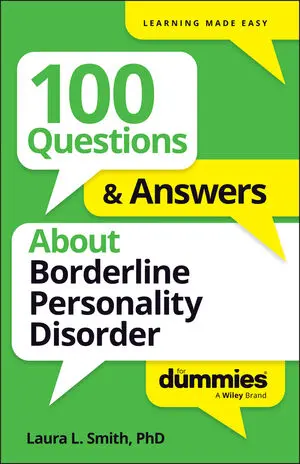 © El Nariz / Shutterstock.com
© El Nariz / Shutterstock.comPersonalities are the relatively consistent ways in which people feel, behave, think, and relate to others. Your personality reflects the ways in which other people generally describe you — such as calm, anxious, easily angered, mellow, thoughtful, impulsive, inquisitive, or standoffish. All people differ from their usual personalities from time to time, but, for the most part, personalities remain fairly stable over time.
For example, consider someone who has a generally jolly personality; this person enjoys life and people. However, when this person experiences a tragedy, you expect to see normal grief and sadness in this generally jolly person. On the other hand, someone with a personality disorder, such as BPD, experiences pervasive, ongoing trouble with emotions, behaviors, thoughts, and/or relationships. The following paragraphs describe the core problems that people with BPD frequently experience.
The American Psychiatric Association has a manual that describes specific symptoms of BPD. The manual groups these symptoms into nine categories. In this article, we condense these nine symptom categories into four larger arenas of life functioning that are easier to digest.
Although BPD has an identifiable set of symptoms, the specific symptoms and the intensity of those symptoms varies greatly from person to person.
Unpredictable relationships
People with BPD desperately want to have good relationships, but they inadvertently sabotage their efforts to create and maintain positive relationships over and over again. You may be wondering how they continually end up in rocky relationships.Well, the answer lies in the fact that their desire for relationships is fueled by an intense need to fill the bottomless hole that they feel inside themselves. People with BPD ache to fill this hole with a sense of who they are, a higher level of self-esteem, and high amounts of outside nurturance, unconditional love, and adoration. But no one can fill such a huge personal chasm. Partners and friends may be defeated soon after they enter the relationship. Their attempts to make their friends who have BPD happy too often fail. The people with BPD reflexively respond to their friends’ efforts with surprising disappointment, pain, and sometimes even anger.
This intense negative reaction confuses partners of people with BPD because people with BPD typically start out relationships with enthusiasm, warmth, and excitement. New partners may feel entirely enveloped by love and caring at the beginning of their relationships, but, repeatedly, things go terribly wrong.
What happens to turn a relationship so full of love and excitement into something full of pain and confusion? Well, many people with BPD fear abandonment above almost anything else. Yet, at the same time, they don’t believe they’re worthy of getting what they really want. They can hardly imagine that another person truly does love them. So, when their partners inevitably fail to fulfill their every need, they believe the next step is abandonment.
This conclusion simultaneously fuels the person with BPD with terror and rage. As a result, they push their partners away. Better to push someone away than to be pushed away, right? This series of reactions is extremely self-defeating, but it’s born out of fear, not malice.
Acting without thinking
Human brains have built-in braking systems, which, in theory, are a lot like the ones that five-ton trucks use to slow down as they roll downhill. These brake systems come in handy when the trucks drive down steep mountains, or, in terms of the human brain, when the intensity of emotions flares up in certain situations. Unfortunately, most people with BPD have brake systems that are adequate for golf carts — not five-ton trucks — which are hardly enough to handle the weighty emotions that often accompany BPD.Brain brakes, as we like to call them, keep people from acting without first thinking about the consequences of their actions. Like rolling dice in a game of craps, behaving impulsively rarely results in winning in the long run. Common impulsive behaviors in people with BPD include the following:
- Impulsive spending
- Gambling
- Unsafe sex
- Reckless driving
- Excessive eating binges
- Alcohol or drug abuse
- Self-mutilation
- Suicidal behavior
Volatile emotions
The emotional shifts of people with BPD are almost as unpredictable as earthquakes. They can also be just as shaky and attention grabbing. After people with BPD unleash their emotions, they usually don’t have the ability to regain steady ground.The rapidly shifting emotional ground of people with BPD causes the people around them to walk warily. In the same day, or even the same hour, people with BPD can demonstrate serenity, rage, despair, and euphoria.
Confusing thoughts
People with BPD also think differently than most people do. They tend to see situations and people in all-or-nothing, black-and-white terms, with few shades of gray. As a result, they consider events to be either wonderful or awful, people in their lives to be either angels or devils, and their life status to be either elevated or hopeless.Sometimes the thoughts of people with BPD travel even closer to the edge of reality. For instance, they may start thinking that other people are plotting against them. They may also distort reality to such a degree that they may seem briefly incoherent or psychotic. Psychosis entails difficulty understanding what is real versus not, including obviously false beliefs and seeing or hearing things that others do not. Such departures from reality are usually brief.
People with BPD also sometimes perceive their bodies as being separate from themselves, which is called dissociation. They describe these occurrences as like looking down at what is happening to them from another vantage point.






